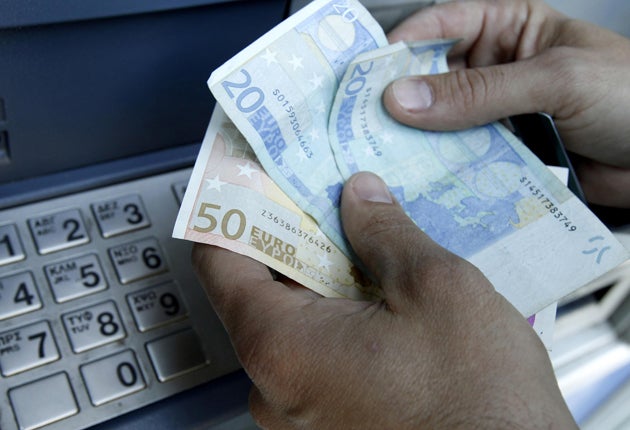Greece Q&A: Crisis in the olive belt. What's next?

Your support helps us to tell the story
From reproductive rights to climate change to Big Tech, The Independent is on the ground when the story is developing. Whether it's investigating the financials of Elon Musk's pro-Trump PAC or producing our latest documentary, 'The A Word', which shines a light on the American women fighting for reproductive rights, we know how important it is to parse out the facts from the messaging.
At such a critical moment in US history, we need reporters on the ground. Your donation allows us to keep sending journalists to speak to both sides of the story.
The Independent is trusted by Americans across the entire political spectrum. And unlike many other quality news outlets, we choose not to lock Americans out of our reporting and analysis with paywalls. We believe quality journalism should be available to everyone, paid for by those who can afford it.
Your support makes all the difference.How did it happen?
A long story. Basically the Greeks, and, to a lesser extent, Portugal, Spain, Ireland and Italy, went on an enormous borrowing and spending binge when they joined the euro.
They were now members of a hard currency area, and that made such excesses possible in a way it hadn't been when all they had to offer foreigners were escudos, drachmas, lire and the rest. They could borrow on the same low-interest-rate terms as the Germans, and they took full advantage. Much of the money funded housing bubbles. But costs and prices drifted badly out of kilter with the eurozone's most efficient economy, Germany, and that lack of competitiveness has to be reversed. Without the option of depreciating the currency, they now have to urge forward "internal devaluation", to push prices and costs back down. This is done via "austerity packages", which are also how they are clawing back their vast government borrowings and debts. These are so large that, in the case of Greece, they cannot meet their debt repayments; hence the emergency loans. As we see from the unrest in Greece, all this is painful and difficult.
Is the Greek crisis over?
For now, yes. But risks remain. In the short term, there is the possibility that opposition to the cuts will be so severe in Greece that they simply cannot be implemented; but if the austerity conditions for the loan are not honoured, then the German parliament might yet reject the deal, or call the loan in. Longer term, the eurozone still has no mechanism to sort out such crises in future. A Greek default remains a possibility.
Who's next?
Portugal – where government securities have recently been marked down very badly. Spain, Ireland and Italy are the others.
Is Greece the new Lehman?
Yes, in the sense that if the country goes down, then all hell will break loose. There could be widespread panic and a sell-off of European government securities. Banks and insurance and investment firms hold these government bonds and will lose money; but, as with sub-prime debt, no one knows who owns what, so inter-bank lending dries up. Then comes a contraction of lending – a second "credit crunch" – more bank failures and a second recession.
Could the euro break up?
It would probably survive the default of Greece, in the same way the dollar has survived default or near default by states such as Mississippi and California, and New York City. However, if more countries follow Greece, then not even the resources of Germany and France would be enough to bail them out. Spain, in particular, poses a problem because of its sheer size. Without Spain, the euro is, in effect, dead.
How will it affect Britain?
Badly. Our banks have approaching £100bn in loans to the weaker European economies. They could lose money directly on any Greek bonds, shares or other assets they hold and which become devalued; more damaging would be that freeze-up in inter-bank lending across the Continent.
As our largest trading partner and source of investment funds by far, the eurozone economy is also vital to our economic health. If confidence and economic activity in Europe stagnates, so will this country; about £15 in every £100 we earn as a nation comes from our exports to Germany, France, Ireland, the Netherlands, Italy, Spain and the rest. Jobs will be lost and businesses will go because of apparently remote events in the olive belt.
Join our commenting forum
Join thought-provoking conversations, follow other Independent readers and see their replies
Comments